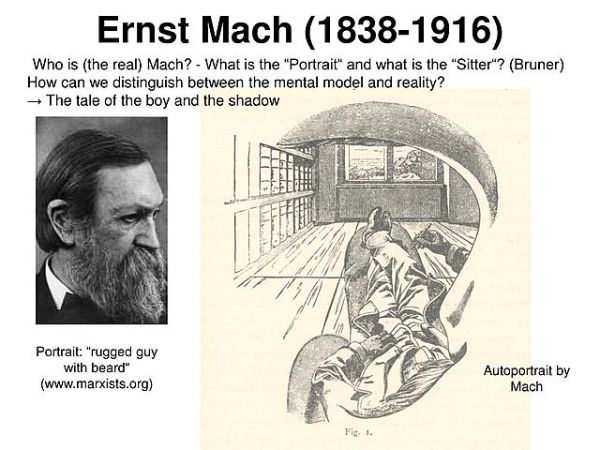He first became a professor of mathematics, then physics, then philosophy: Who is Ernst Mach?
Ernst Mach, one of the important representatives of the positivist understanding of science and the Vienna intellectual environment, is an important scientist and thinker who studies the fields of physics, psychology, education, and philosophy.

Ernst Waldfried Joseph Wenzel Mach was born on February 18, 1838, in Chirlitz, which was then part of the Austrian Empire. His father, Johann Nepomuk Mach, studied philosophy at Karl-Ferdinand University (today Karl University Prague) in Prague, where he took courses in a wide variety of fields. He made his living by tutoring the two sons of a baron.
Ernst Mach was educated at home by his father until he started high school in the fall of 1853, and he took lessons such as Greek, Latin, history, geometry, and algebra from his father. He graduated from high school in 1855 and began studying physics at the University of Vienna. He completed his doctorate in physics in 1860 and became a lecturer. Struggling with financial difficulties for a while, Mach took a job as a professor of mathematics at the University of Graz in 1864, as he put it, "when his power was about to run out", and in 1866 he became professor of physics. In 1867 he took a job as a professor of experimental physics at Karl-Ferdinand University and remained there until 1895 when he became a professor of philosophy at the University of Vienna. He gradually weakened after a stroke in 1898. He retired from the University of Vienna in 1901. After staying in Vienna until 1913, he moved to Vaterstetten with his son. He died here on February 19, 1916.
Ernst Waldfried Josef Wenzel Mach (8 February 1838 – 19 February 1916) was an Austrian physicist and philosopher, who contributed to the physics of shock waves. The ratio of the speed of a flow or object to that of sound is named the Mach number in his honour. As a philosopher of science, he was a major influence on logical positivism and American pragmatism. Through his criticism of Newton's theories of space and time, he foreshadowed Einstein's theory of relativity.
Mach, who was the chairman of the chair of inductive sciences at the University of Vienna, where he received his doctorate in physics, was influential on the thoughts of the Vienna Circle, which would express its views with the manifesto "Scientific Understanding of the World" in 1929. This community, which was formed by a group of scientists such as Moritz Schlick, Otto Neurath, and Rudolf Carnap, was also known as "The Verein Ernst Mach" in the early days.
Mach's early physics work was on the acoustic and optical Doppler effect. Mach is known by many for his "Mach number", which also bears his name, which is the ratio of the speed of a moving mass to the speed of sound under the conditions of the mass, indicating that a material object exceeding the speed of sound will have an effect called a sonic boom.
Mach played an important role in putting forward Einstein's general theory of relativity with his criticisms of Newton's absolute time and space concepts. Einstein sees Mach as the predecessor of his work on the general theory of relativity and attributes the philosophical background of his theory to him. In his book The Science of Mechanics, published in 1883, Mach opposes the idea of absolute space, which is the basis of Newtonian mechanics.
Mach, who also works on different lighting distributions, is also the father of the optical illusion called Mach bands. One afternoon in the late 1800s, Ernst Mach looked intently at several strips of homogeneously colored paper arranged side by side. As someone who is interested in perception, there was something that caught his attention. There seemed to be something in the strips that seemed off-putting to the eye; something was missing. He pulled the strips apart, looked at each one at a time, and then put them back together. He finally understood what was going on. Although the stripes exhibited a homogeneous color distribution when taken individually, there seemed to be gradual shading when they came together: slightly lighter on the left, and slightly darker on the right.
The importance of Mach comes from his skepticism towards the scientific understanding and studies of his time, with his identity as a philosopher rather than his physical studies. The motif in the background of Mach's critical attitude is his anti-realist thoughts that also frame his scientific approach.
Ernst Mach was also the other developer of empiric-criticism, propounded by Richard Avenarius. This philosophy, the second stage of positivism, denied that the senses were created by an objective reality that existed independently of man, and argued that objective reality was nothing more than a symbol of some combination of senses. Among those influenced by Mach's ideas were a group of so-called Russian Machists in the Bolshevik party, including Vladimir Bazarov, Aleksandr Bogdanov, and Anatoly Lunacharsky. This prompted Lenin to defend materialism against idealist deviations from Marxism and to write Materialism and Empirio-Criticism for this purpose. Apart from this, the third stage of positivism, logical positivism or neopositivism, was also strongly influenced by Mach's ideas.
